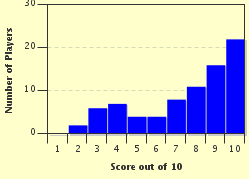Quiz Answer Key and Fun Facts
1. In 1951, Alan Turing, a brilliant mathematician from Cambridge, has had his house in Manchester burgled, although nothing appears to have been stolen. The police are called to investigate, and they find Alan Turing hunched over in his kitchen with a scarf tied over his mouth and nose, carefully sweeping up a pile of white powder from the floor. What is this substance?
2. In 1939, Alan Turing is being interviewed by Commander Denniston of the Royal Navy for a position in a top secret program in Bletchley Park. Alan gets the job, even though he couldn't seem less interested in helping out the war effort. Which of these things does he NOT say during his interview?
3. Alan believes that they need to build a machine to break the Engima code, but he doesn't get any support from the rest of his team in Hut 8 or from Commander Denniston, so he goes over their heads and gets put in charge. The first thing Alan does is to fire the two worst cryptographers in the team, which means that they will need to hire replacements. What does Alan use to screen potential candidates to see if they would make good code-breakers?
4. People from all walks of life answer the job ad, so Alan and Stewart Menzies, the head of MI6, arrange for a follow-up evaluation to separate the truly exceptional candidates from the chaff. Joan Clarke, a mathematician with a double-first from Cambridge, is one of two finalists selected to join the team in Hut 8 at Bletchley Park, but she fails to show up for work as expected. Why?
5. Joan convinces Alan that he should get the others in Hut 8 to like him, because he will need all the help he can get to break Enigma. What does Alan hand out to the rest of the team in an attempt to win them over?
6. With the war dragging on without any sign of resolution, Joan comes under increasing pressure to return home, so she decides to leave Bletchley Park. What does Alan do to get her to stay?
7. The team are at the pub in Bletchley Park when a flirtation between Hugh and Helen, a member of the Women's Royal Naval Service, gives Alan an idea that holds the key to unlocking the code. What phrase turns out to be "the only German you need to know to break Enigma"?
8. The "Imitation Game" in the film's title is a reference to a test postulated by Alan Turing to distinguish between which of the following pairs of things?
9. The machine in Bletchley Park designed by Alan to break the Enigma code was affectionately named "Christopher", after an important figure from Alan's childhood. Who was Christopher?
10. Joan pays a visit to Alan after his conviction for indecency to find him a very different man. He is undergoing hormonal therapy as a condition of his probation, and it seems to be affecting his reflexes and mental faculties. When he appears to envy Joan's normal life, what does Joan tell him?
Source: Author
jmorrow
This quiz was reviewed by FunTrivia editor
skunkee before going online.
Any errors found in FunTrivia content are routinely corrected through our feedback system.

